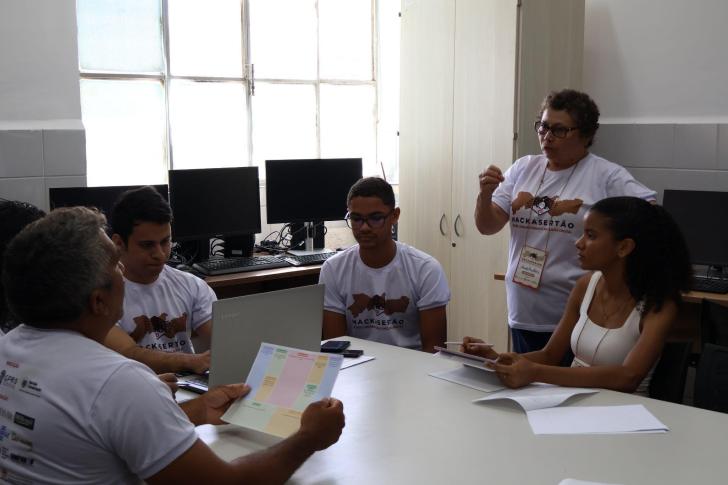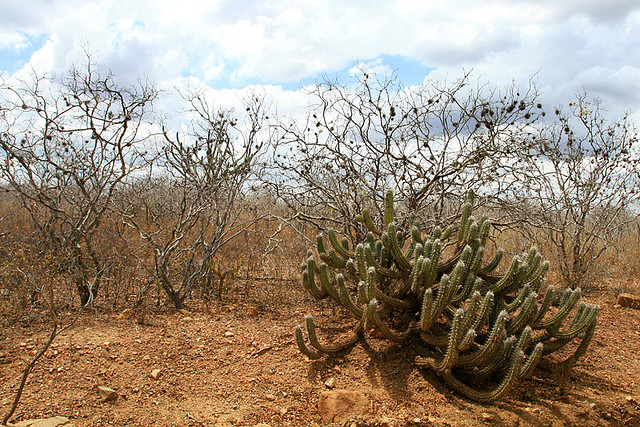
In Brazil, it is said that caatinga, the characteristic vegetation of the semi-arid Northeast, is a symbol of resilience. It is not always that white, or that dry; the caatinga ecoregion explodes with life, and has a history of hosting power struggles, the Cangaço and the resistance of Canudos. Contrary to the stereotype of hunger and degradation, the caatinga is home to the umbuzeiro, tree, which feeds those crossing the Sertão subregion, a space of struggle and identity, for both humans and non-humans. Within this environment, the Instituto Federal do Sertão Pernambucano (IFSertão-PE), a technical, undergraduate and graduate teaching institution, founded a university centre with the aim of promoting democratisation of internet access and meaningful connectivity, the Núcleo de Extensão de Redes Comunitárias.

Caatinga vegetation is a symbol of resilience. Photo: Maria Hsu (CC)
This centre is currently working on implementing a community network in a quilombola community, a term used in Brazil for traditional Black communities built and inhabited by descendants of Africans enslaved in Brazil. This aim of this pioneering project is not only to provide meaningful connectivity by installing an internet network in the territory, but also to offer training and technological capacity building for IFSertão-PE students, sensitising them to the problem of unequal access to the internet and digital technologies among vulnerable populations, and for the quilombola community, to ensure the sustainability of their network.
With support from the Local Networks (LocNet) initiative, through a microgrant call held in August 2024 that funded 11 projects in Brazil, IFSertão-PE decided to host a three-day hackathon, bringing together students and members of quilombola, Indigenous and small farming communities from the Salgueiro region. The event was an opportunity to introduce the first steps for installing a community network and to consider responses to the many challenges that can arise in this process.
Between 28 and 30 March 2025, about 70 students and local community members took part in training activities on technological themes, ranging from conceptual discussions about community networks, to learning about methods of sustainability and network maintenance, to developing a project with a budget and list of technologies to be used.
Building together
On the first day, participants were introduced to the general concept of community networks through the roundtable “Community networks: What on Earth are they?”, with representatives from LocNet (an initiative led by APC and Rhizomatica), ISOC Brasil, Cetic.br and the Instituto Bem Estar Brasil. Nathalia Foditsch from Connect Humanity also presented the idea of meaningful connectivity. The day closed with a cultural performance of local music, a moment of rest and entertainment before the intensive work that awaited the following day.
On the second day, 10 groups were formed. Some took part in technical workshops on how to install a community network, while others joined thematic workshops on subjects such as step-by-step network development, using the LocNet/APC community networks manual; an introduction to calls for proposals for community networks, such as those offered by the Internet Society (ISOC); and experiences in creating sustainability through local micro-entrepreneurship.
During the afternoon, the groups met again to use the knowledge acquired during the morning to design a community network project based on simulated or real challenges posed by the Hackasertão organisers, such as installing a network on a hard-to-reach island or in an area regularly affected by flooding. Each group received mentorship from two members of the marathon organisation: one technical expert, and one focused on funding opportunities, sustainability and budgeting.

On the last day, each group presented its project. The organisers graded them and selected the best proposal, the one that would receive antennas and routers to install a network in a community chosen by the group itself. Although the typical hackathon model stimulates competition among participants, Hackasertão sought to create a space of collective learning and collaboration. “I like taking part in activities like this, as I always learn new things,” said Auxiliadora, a leader from one of the nearby rural communities.

The city of Salgueiro is known as the crossroads of the Brazilian Northeast, as it is equidistant from all the state capitals in the region. However, for Antônio Bispo, a quilombola intellectual, activist and writer, a crossroads is not just a point where paths intersect, but a space of dialogue, conflict and the creation of new knowledge. It is in this crossroads of knowledge between the institutional and the community, the academic and the ancestral, that the IFSertão-PE Núcleo de Extensão de Redes Comunitárias perseveres in teaching, through extension projects and collective technological practices.
Marcelo Santos is a professor at IFSertãoPE and carries out research and projects focused on community networks and digital inclusion, with an emphasis on bringing connectivity to vulnerable communities. Since 2019, when he took part in the Internet Society (ISOC) course on “Building Wireless Community Networks”, he has deepened his work in this area, coordinating Brazil’s first Núcleo de Extensão em Redes Comunitárias. He is also the creator of Hackasertão, an event aimed at fostering new leaders in community networking and promoting the concepts of community networks and meaningful connectivity. His work seeks to integrate teaching, research and extension practices in emerging technologies, with a focus on developing solutions that support digital inclusion and regional development.
Criz is an activist and researcher focused on internet access and digital rights, who co-coordinated the microgrants project of the Local Networks initiative (LocNet) in Brazil and Indonesia between October 2024 and May 2025.
The experience shared in this blog was supported by the Local Networks (LocNet) initiative through a cycle of microgrants made available via a closed call to the initiative's partners and community networks in Brazil, Indonesia, Kenya and South Africa. Learn more about the call here.